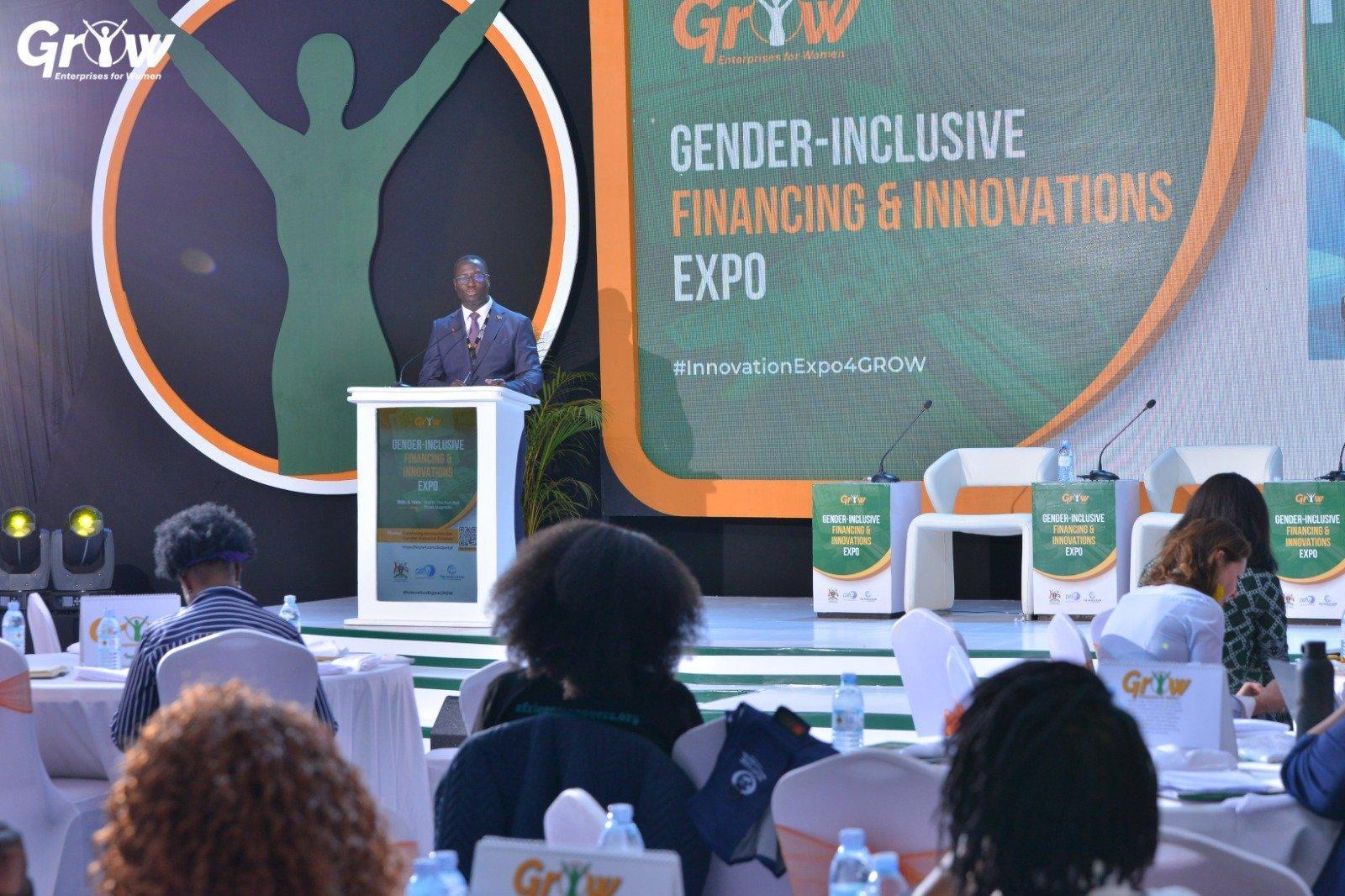Africa-Press – Uganda. The Gender-Inclusive Financing Innovation Expo 2025 has concluded with a resounding call to action for systemic reforms, public-private partnerships, and inclusive financial solutions that empower Uganda’s women entrepreneurs.
Held under the theme “Catalyzing Innovation for Gender-Inclusive Finance,” the two-day Expo was organized by the Ministry of Gender, Labour and Social Development (MGLSD) in partnership with the Private Sector Foundation Uganda (PSFU), with technical support from the World Bank.
It convened stakeholders from government, financial institutions, fintech innovators, development partners, civil society, and women-led businesses.
The Expo is part of the broader Generating Growth Opportunities and Productivity for Women Enterprises (GROW) Project, a government-led initiative launched in 2023 to support women entrepreneurs through innovation grants, inclusive lending models, and institutional reform.
In his closing address, Aggrey Kibenge, Permanent Secretary at MGLSD, framed the Expo as more than a forum—it was a launchpad for real change.
“We have unpacked the realities, interrogated the challenges, and spotlighted solutions that are beginning to transform the financing landscape for women entrepreneurs in Uganda. The real work begins now.”
Among the solutions showcased were non-collateralized lending tools, alternative credit scoring systems, Islamic finance products, and digitally driven services designed with women in mind—especially those in underserved or rural communities.
Despite owning nearly 40% of Uganda’s businesses, women access only 24.4% of formal credit, according to data presented at the Expo.
Many continue to rely on informal finance—such as savings groups and mobile money—offering limited scalability and security.
Kibenge underscored that women are not seeking handouts, but fair, responsive, and accessible financial systems.
Through the GROW Project’s Financing Facility (GFF), six commercial banks—DFCU, Equity, Finance Trust, Centenary, PostBank, and Stanbic—have partnered to offer women-led enterprises loans ranging from Shs 4 million to Shs 200 million.
Interest rates are capped at 10.5%, with repayment incentives built in through innovation grants.
PSFU CEO Sarah Kagingo praised the Expo as a pivotal moment in Uganda’s quest for economic inclusion.
“Women-owned businesses are a cornerstone of Uganda’s economy. Yet access to finance remains a persistent hurdle. This Expo is a bold step toward closing that gap through innovation, collaboration, and data-driven solutions.”
While government programs like UWEP and the Parish Development Model (PDM) have laid important groundwork, Kagingo noted the urgent need for scalable, unsecured loan products tailored to women-led enterprises.
Citing the Auditor General’s 2024 report, which showed that only Shs 18.52 billion of the Shs 75.1 billion GROW budget had been absorbed, she called for better strategies to boost uptake—especially in rural and refugee-hosting communities.
“We need to embrace digital lending, gender-sensitive products, and simplified loan applications to ensure no woman entrepreneur is left behind.”
One of the Expo’s most promising outcomes is the foundation for the Women Entrepreneurship Financing Learning Lab (WEFL)—a new hub for ongoing research, policy innovation, and sector reform.
WEFL will serve as a think tank and incubator, turning pilot projects and field data into scalable, impactful solutions.
Insights from the Expo will directly inform WEFL’s roadmap, including new collaborations with microfinance institutions to expand collateral-free lending and partnerships with fintech startups creating tools for rural women.
As Uganda prepares its Fourth National Development Plan (NDP IV), public and private sector leaders pledged deeper collaboration to embed gender equity in finance and budgeting.
Kibenge, speaking earlier during the Expo in his role as PS at the Ministry of Finance, Planning, and Economic Development, said:
“We must go beyond funding programs—to funding systems that work for women. Our budgeting and policies must reflect the realities of the people we serve.”
He affirmed the government’s commitment to expanding fiscal space for women’s economic empowerment and incentivizing private sector involvement in inclusive finance.
With the conclusion of the Gender-Inclusive Financing Innovation Expo 2025, Uganda has taken a significant step toward reshaping its financial ecosystem to include—and prioritize—women.
“Inclusive finance is not the exception—it is the new standard,” Kibenge emphasized. “Let us commit to making gender-inclusive finance not just a possibility, but a priority.”
As participants return to their institutions, energized by new partnerships and insights, the momentum from the Expo is expected to fuel reforms that unlock dignity, opportunity, and economic power for women across Uganda.
For More News And Analysis About Uganda Follow Africa-Press






